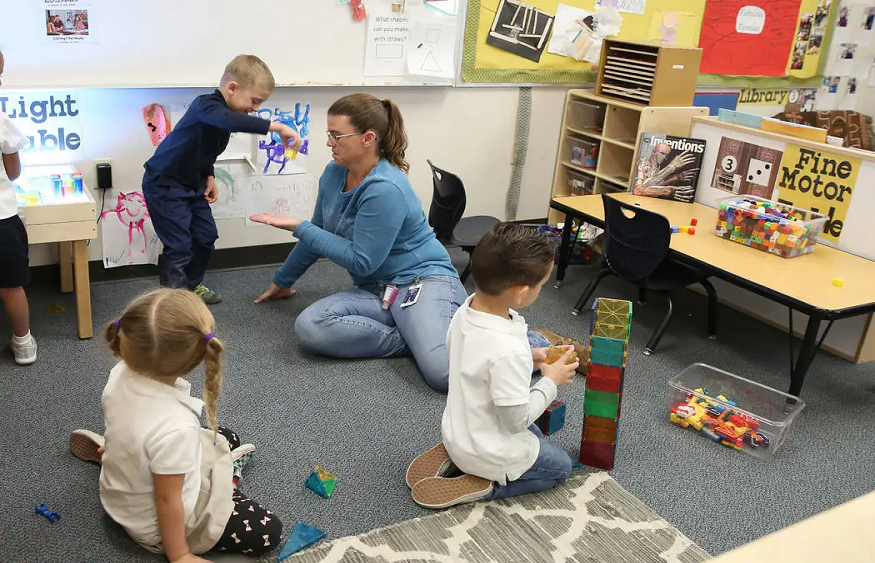Early childhood is a crucial period for cognitive development, and fostering a love for reading during these formative years can set a strong foundation for a child’s lifelong learning journey.
Preschool reading classes play a vital role in introducing young children to the world of language and literature.
In this blog post, we will explore the importance of English reading for preschool and how they can significantly contribute to your child’s overall development.
The Significance of Preschool Reading Classes
Preschool reading classes go beyond teaching children how to decode letters and words; they focus on creating a nurturing environment that promotes language development, imagination, and a genuine love for reading.
During these early years, children’s brains are like sponges, absorbing information at an astonishing rate.
Engaging them with age-appropriate reading materials and activities can have a profound impact on their cognitive, emotional, and social growth.
Language Development and Vocabulary Expansion
Preschool reading classes are a treasure trove of language-rich experiences. Through storybooks, rhymes, and interactive activities, children are exposed to a diverse range of words, sentence structures, and ideas.
This exposure enhances their vocabulary, enabling them to communicate more effectively and understand complex concepts as they progress through their educational journey.
Research has shown that children who are read to from a young age develop stronger language skills, better communication abilities, and a deeper grasp of grammar and syntax.
Cognitive Skills Enhancement
The act of reading is a cognitive workout for young minds. When children engage with books, they embark on a journey of cognitive exploration.
They learn to make predictions, analyze story elements, and connect different pieces of information.
Preschool English lessons often incorporate activities that stimulate critical thinking, problem-solving, and memory retention. These skills are not only essential for academic success but also for navigating the challenges of everyday life.
Imagination and Creativity
Children have an innate ability to imagine and create. Preschool reading classes harness this natural talent by exposing children to a world of imagination through stories.
As they dive into captivating narratives, children visualize scenes, characters, and settings, fostering their creative thinking abilities.
This enhanced imagination transcends the world of literature and spills over into various aspects of their lives, encouraging innovative thinking and out-of-the-box problem-solving.
Social and Emotional Development
Stories have the power to evoke emotions and empathy. Preschool reading classes capitalize on this by encouraging children to connect emotionally with characters and situations in stories.
Through group readings, discussions, and role-playing activities, children learn to identify and understand emotions. This process contributes to their emotional intelligence, helping them navigate social interactions with greater empathy and sensitivity.
Early Literacy Skills
Preschool English learning lay the foundation for future literacy skills. As children engage with letters, sounds, and phonemic awareness activities, they develop the building blocks necessary for reading and writing proficiency.
Exposure to the mechanics of language at a young age makes it easier for children to decode words, blend sounds, and eventually read independently. This early literacy foundation sets the stage for a smoother transition into formal education.
Promoting a Love for Reading
Perhaps the most enduring gift of preschool reading classes is a genuine love for reading. When children are introduced to books as sources of enjoyment and discovery, they develop a lifelong affinity for reading. This passion extends beyond the classroom and enriches their leisure time.
A love for reading opens doors to new worlds, diverse perspectives, and a lifelong pursuit of knowledge.
Parental Involvement and Support
Preschool reading classes foster a strong partnership between educators and parents. Many programs encourage parents to participate in reading activities at home, further reinforcing the importance of reading in a child’s life.
This collaborative approach strengthens the parent-child bond and enables parents to witness their child’s growth and development firsthand.
By engaging in reading alongside their child, parents become role models who emphasize the value of learning and curiosity.
Laying the Foundation for Critical Thinking
Critical thinking is a fundamental skill that empowers individuals to analyze, evaluate, and synthesize information.
Preschool reading classes encourage children to ask questions, make predictions, and draw conclusions based on the text.
These activities stimulate their critical thinking abilities, enabling them to approach problems with a logical and analytical mindset as they progress in their education.
Lifelong Exploration and Curiosity
Preschool reading classes ignite a spark of curiosity that drives children’s desire to explore and learn.
By nurturing this curiosity, children are more likely to become independent learners who actively seek knowledge and engage with the world around them.
This intrinsic motivation becomes a driving force behind their educational pursuits and personal growth.
Building Resilience and Coping Skills
Stories often present characters facing challenges and overcoming obstacles. Preschool reading classes offer children the opportunity to observe characters navigating difficulties and finding solutions.
These experiences contribute to the development of resilience and coping skills, helping children understand that setbacks are a natural part of life and can be overcome with determination and perseverance.
Strengthening Concentration and Focus
In an age of constant distractions, cultivating the ability to focus is a valuable asset. Preschool reading classes encourage children to immerse themselves in a story, enhancing their concentration and attention span.
The practice of focusing on a narrative helps children develop the discipline needed to concentrate on tasks, a skill that will serve them well in their academic and personal endeavors.
Cultural and Global Awareness
Through stories, children are transported to different cultures, times, and places. Preschool reading classes expose children to a world beyond their immediate surroundings, fostering cultural awareness and global understanding.
By exploring stories from different backgrounds, children develop empathy, respect, and an appreciation for diversity, which are essential qualities for thriving in an increasingly interconnected world.
Conclusion
Preschool reading classes offer a wealth of benefits that extend far beyond the act of reading itself. By immersing children in language-rich experiences, stimulating their cognitive abilities, and nurturing their emotional intelligence, these classes pave the way for a future marked by success, curiosity, and a deep appreciation for learning.
As parents, investing in a top childcare in Singapore is an investment in your child’s future. Through the pages of storybooks, children embark on a journey of discovery, imagination, and personal growth, forging a path towards a lifetime of reading, exploration, and intellectual fulfillment.

